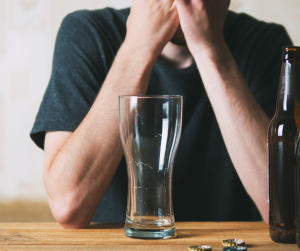Everything you need to know about Alcohol Use Disorder
Alcohol over-consumption is widespread across the UK.
According to UK Parliament Research*, an estimated 10 million people in England regularly exceed the Chief Medical Officers’ low-risk drinking guidelines, including 1.7 million who drink at higher risk and around 600,000 who are dependent on alcohol.
These figures show that a sizable proportion of our population has some form of alcohol use disorder. However, recognizing or acknowledging problematic drinking can be difficult for many of us.
In this article, we’ll explore what alcohol use disorder is, its causes and symptoms, its impact, and what help is available if you’re concerned about your drinking habits.
What is alcohol use disorder?

Alcohol use disorder (sometimes called alcoholism, problem drinking or addiction) is a common medical condition. People living with this condition are unable to stop drinking, even when it becomes harmful to their lives and negatively impacts those around them.
The disorder can be mild, moderate or severe. However, if left untreated, any alcohol use can spiral out of control.
What are the symptoms of alcohol use disorder?
Alcohol use disorder symptoms tend to manifest through mood and behaviour changes. You should seek advice if you find yourself:
- Craving alcoholic beverages
- Frequently drinking despite the negative impact on relationships with family, friends and colleagues
- Drinking more than you planned or for longer than you intended
- Spending excessive time drinking alcohol or recovering from hangovers and other ill-effects
- Repeatedly attempting to reduce how much you drink without success
- Failing to meet work or family obligations as a result of your drinking
Other signs of alcohol use disorder include:
- Giving up important social, work or recreational activities because of alcohol.
- Using alcohol in dangerous situations, such as driving
- Continuing to drink with a medical condition that gets worse with alcohol
- Having a high tolerance for alcoholic drinks
- Having alcohol withdrawal symptoms or drinking to avoid withdrawal symptoms
Regularly monitoring your alcohol consumption is a crucial step in maintaining health and reducing the risk of developing alcohol use disorder.
How much is too much?

You can stay in control of your drinking habits by knowing your alcohol units. The number of units in a drink depends on the drink’s size and alcohol content.
For example, a pint of 5.5% strength lager contains 2.4 units of alcohol, while a 175ml glass of 12% strength wine contains 2.3 units.
To keep health risks from alcohol low, the Chief Medical Officer advises that you:
- Drink no more than 14 units a week regularly
- Spread your drinking over three or more days if you regularly drink as much as 14 units a week
- Have several drink-free days each week
- Avoid binge drinking
Binge drinking is defined as consuming more than eight units of alcohol in one sitting for people assigned male at birth or more than six units for people assigned female at birth.
Who does alcohol use disorder affect?
Alcohol use disorder can affect any of us at any time. However, it affects young and middle-aged men more than any other demographic.
Between 10% and 27% of deaths are alcohol-related for men aged between 16 and 55. The figures for women in the same age group are between 6% and 15%.
Alcohol also significantly impacts the families and children of those with alcohol use disorder. 1.3 million children in the UK suffer alcohol-related abuse or neglect.
Meanwhile, almost 50% of all violent offences in the UK are alcohol-related.
Alcohol’s impact on our country is also concerning. Alcohol-related issues cost the NHS an estimated £3.5 billion per year in England and costs an estimated £21 billion per year to society.
Why do people develop alcohol use disorder?
Alcohol is legal, accessible and affordable in the UK. For the most part, drinking is also socially acceptable, with many people using alcohol to celebrate special occasions, socialise or unwind after a busy week.
However, people often rely on alcohol to deal with stress, mental health issues and personal problems, which can lead to problems such as:
Using alcohol as stress-relief
Alcohol encourages the brain to release a chemical called dopamine, which is known as a ‘happy hormone’. When we take our first few sips of an alcoholic drink, our bodies produce extra dopamine, which travels to our brain’s reward centres and makes us feel good.
However, alcohol also depresses the body’s central nervous system – making us lose coordination, become more accident-prone, and less aware of our actions and surroundings.
Excessive alcohol consumption causes nausea and dehydration, whilst frequent drinking can lead us to become dopamine-deficient and suffer from mental ill-health.
Relying on alcohol to reduce stress can increase the likelihood of developing alcohol use disorder.
Using alcohol as a coping mechanism
Grief and trauma can take an emotional, physical and mental toll. Alcohol can temporarily ease feelings of loss and can become a crutch for dealing with challenging times or experiences.
However, longer-term alcohol use is often detrimental to our overall well-being. For example, a hangover after a heavy drinking session can be a wretched experience, leaving us in a poor mental and physical state.
Relying on alcohol for emotional support, even for a short time, can lead to dependency.
Using alcohol to reduce anxiety
Some people are naturally anxious, causing them to worry about social situations. Drinking lowers inhibitions and makes them more comfortable amongst other people.
When we drink, we may feel less anxious and more confident. But these effects don’t last for long. They can soon lead to more negative feelings, such as anger, increased anxiety, and even depression.
Many people believe drinking will make it easier for them to make new social connections. However, the opposite outcome is often the case, with excessive alcohol consumption being a leading cause of relationship breakdowns.
We must remember that despite alcohol being popular for stress relief, as a coping mechanism or temporary mood booster, it’s a toxic, addictive, and carcinogenic substance that negatively impacts many of us.
What help is available for alcohol use disorder?
If you or someone you know is struggling with alcohol use disorder, remember that there are healthcare professionals, such as doctors, therapists, and counsellors, who can provide the necessary support and guidance to overcome this condition.
It’s essential you choose what’s right for you. These sites have information on the available options.
You can call YMCA Together’s rehab service on 0151 474 0685 and find information about your local service here.
If you’re a friend or family member impacted by a loved one’s alcohol issues, you can find help and support here.
